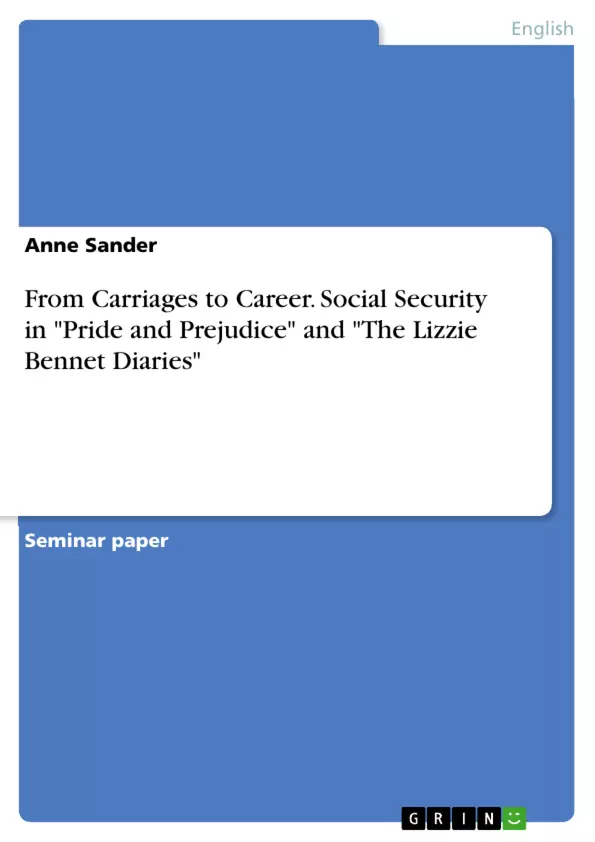It is clear that in today’s society the necessity to marry is not as strong as it was in Jane Austen’s time. Back then, women had to marry in order to survive; now, at least in the modern Western world, this is not the case. Women have more opportunities when it comes to their future, without having to marry. For a woman to have a career may seem normal today, but in 19th century England this was not an option. However, the need to live a good and secure life is still troubling women today.
The web series The Lizzie Bennet Diaries (2012) is a modern adaptation of Jane Austen’s Pride and Prejudice (1813), where Lizzie Bennet vlogs about her friends, family and life. Even though Pride and Prejudice and The Lizzie Bennet Diaries take place in different times, social security still influences the lives of the characters.
In Pride and Prejudice, Lizzy Bennet wants to marry but only for love and not because her mother is telling her to. She rejects Mr. Collins' and Mr. Darcy's first proposal because she does not love them. Eventually Lizzy does get married, because she falls in love with Mr. Darcy and accepts his second proposal, thereby fulfilling her intention to marry for love. In The Lizzie Bennet Diaries, Lizzie is a grad student, living at home together with her parents and her two sisters. She is single, but getting a boyfriend is not one of her concerns. Instead, she is trying to get a good job to start her career and to justify her expensive education.
Charlotte Lucas marries Mr. Collins, not because she loves him, but because she wants and needs to get married. She ends up unhappy but she reaches her goal to find a husband and obtain a secure life. Charlotte Lu accepts Mr. Collins’ job offer because she sees an opportunity in this employment to help her in the future. She benefits from this job at Collins & Collins despite Lizzie disagreeing.
Inhaltsverzeichnis (Table of Contents)
- Introduction
- Elizabeth
- Pride and Prejudice
- The Lizzie Bennet Diaries
- Charlotte
- Pride and Prejudice
- The Lizzie Bennet Diaries
- Conclusion
Zielsetzung und Themenschwerpunkte (Objectives and Key Themes)
This work explores the theme of social security in Jane Austen's *Pride and Prejudice* and its modern adaptation, *The Lizzie Bennet Diaries*. It examines how societal expectations and the need for financial stability influence the characters' choices and actions, particularly regarding marriage and career aspirations. The comparison between the 19th century and the modern setting highlights the evolving role of women in society and the enduring relevance of themes related to social security and individual agency.
- Social Security and its impact on women's lives
- Marriage as a means of social and economic security
- The evolving role of women in society
- The tension between individual desires and societal expectations
- The role of career and education in securing a future
Zusammenfassung der Kapitel (Chapter Summaries)
- Introduction: This chapter establishes the context for the analysis by comparing the social realities of 19th-century England and the present day, focusing on the changing role of marriage and women's access to career opportunities. It introduces the two works, *Pride and Prejudice* and *The Lizzie Bennet Diaries*, and their respective depictions of social security and its impact on the characters' lives.
- Elizabeth: This section explores the character of Elizabeth Bennet, examining her views on marriage and her interactions with potential suitors. It analyzes how her choices are influenced by her desire for love, financial security, and social standing. The chapter compares Elizabeth's experiences in both *Pride and Prejudice* and *The Lizzie Bennet Diaries*, highlighting the similarities and differences in her circumstances and choices.
- Charlotte: This section delves into the character of Charlotte Lucas, contrasting her pragmatic approach to marriage with Elizabeth's romantic ideals. It examines how Charlotte's decision to marry Mr. Collins is driven by a desire for social and financial security, even if it means sacrificing personal happiness. The chapter explores the consequences of her choice and how her actions reflect the social pressures of the time.
Schlüsselwörter (Keywords)
This work explores the themes of social security, marriage, career, and individual agency. It examines how societal expectations and the need for financial stability influence the choices and actions of the characters. It also focuses on the evolution of the role of women in society and the enduring relevance of themes related to social security and individual agency. Key concepts include the Landed Gentry, inheritance laws, marriage as a social contract, and the challenges faced by women seeking independence in different historical contexts.
Frequently Asked Questions
How does social security differ between Pride and Prejudice and its modern adaptation?
In Austen's time, social security for women was almost entirely tied to marriage and inheritance. In the modern "Lizzie Bennet Diaries," it is linked to education and career aspirations.
Why did Charlotte Lucas marry Mr. Collins?
Charlotte married for pragmatic reasons: she needed financial and social security. Although she wasn't in love, she achieved her goal of a secure household.
What does Elizabeth Bennet's marriage represent?
Elizabeth represents the desire for individual agency, refusing to marry for security alone and eventually finding a partner (Mr. Darcy) for love, while still achieving social stability.
How is Charlotte Lu's choice in the modern vlogs different?
Instead of marriage, Charlotte Lu accepts a job offer from Mr. Collins to secure her professional future, reflecting the modern shift from marital to career-based security.
What are the key themes explored in this comparison?
The work explores social security, the evolving role of women, the impact of inheritance laws, and the tension between personal happiness and societal expectations.
- Quote paper
- Anne Sander (Author), 2015, From Carriages to Career. Social Security in "Pride and Prejudice" and "The Lizzie Bennet Diaries", Munich, GRIN Verlag, https://www.grin.com/document/416284



